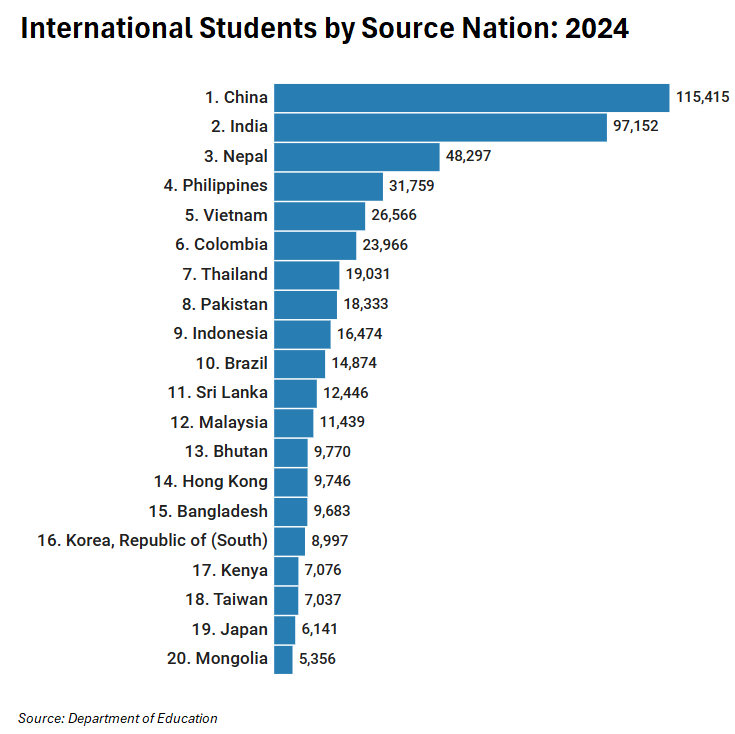The higher education lobby continually spouts the lie that international students are a vital export industry for Australia, generating $46 billion of export earnings for the nation.
This fantastical export figure is derived by combining “an average spend estimate from Tourism Research Australia … supplemented by the addition of the total expenditure on course fees.”
The reality is that most students come from poorer nations with few financial resources and must work in Australia to fund their living expenses and tuition fees.

Indeed, a recent survey by Navitas showed that students from South Asia and Africa selected a study destination based primarily on their ability to obtain work rights, a low-cost course, and permanent residency:

Only Chinese and European students care about education quality.
A large number of these students also take up low-cost courses at dodgy private colleges with the explicit purpose of working and living in Australia.
In either case, international education is not a major export because most students pay for tuition and living expenses with money earned while working in Australia.
Nonetheless, the ABS, Treasury, the education sector, and the media mistakenly categorise such living expenses and course fees as exports, even when they are paid for with Australian earned money.
As a result, Australian policymakers have pandered to the international education industry by providing work and migration pathways to students in a bid to grow numbers and “export” volumes.
Salvatore Babones, Associate Professor at Sydney University and author of the book, “Australia’s Universities, Can They Reform?”, recently summed up the “export” farce as follows:
[The $46 billion export figure] is based on the fantastical model that a typical international student saves up the full cost of tuition, housing, meals, and incidentals, transfers it to an Australian bank, and then lives on that money for the duration of stay in Australia.
This may be true for a small number of elite university students. But university students make up only 45% of the international student total, and most of those are non-elite.
Just watch the 2019 Four Corners special Cash Cows to find out how things really work at a typical university, and then remember that most international students are not even in universities, but in low-level vocational and English-language courses.
The idea that all (or even a substantial portion) of the money spent by these students is transferred from abroad, rather than earned in Australia, is flatly ridiculous.
To see that, just remember the uproar that broke out in 2020 when Scott Morrison refused to extend JobKeeper and JobSeeker to international students. Most international students in Australia work very hard, but the fact is that they come to Australia primarily to work, not to study.
The tuition they are required to pay is simply part of the cost of their work visas…
In short, the entire international student industry is, in essence, a giant immigration scam.
With this background in mind, it was interesting to watch current and former Indian Students in Canada protest against recent changes to immigration rules that prioritise migrants working in specific occupations. This has left migrants working in retail, food, and service industries at a disadvantage.
The changes were made due to pressure on the province’s healthcare system and housing market.
The protests have been ongoing since 9 May, with some participants even engaging in a hunger strike since 28 May.
This policy shift has alarmed many graduates-turned-workers in the province, particularly those whose work permits are set to expire soon.
The protesting students have outlined three primary demands: grandfathering of current migrants already in Canada; non-exclusion of sectors like sales, services, and trucking; and the extension of work permits.
If the rules don’t change, students are reportedly planning to hold a 24-7 hunger strike.
“We are aware of as many as 300 graduates in PEI [the province of Prince Edward Island], working in retail and service industries, whose work permits will be expiring in the next 1-2 months”, Manpreet Kaur, a volunteer for the Montreal Youth Student Organisation, explained.
“Many Indian graduates in PEI want to stay here and be taken seriously. Instead, rules were changed overnight which has deeply impacted them”, they said.
Let’s be honest: if work rights and permanent residency were significantly scaled back, the number of international students studying in nations like Australia and Canada would collapse.
Why? Because most students from poorer nations don’t come to developed nations for an education, but to work and live.
Thus, international education “exports” are really imports of people from developing nations.

